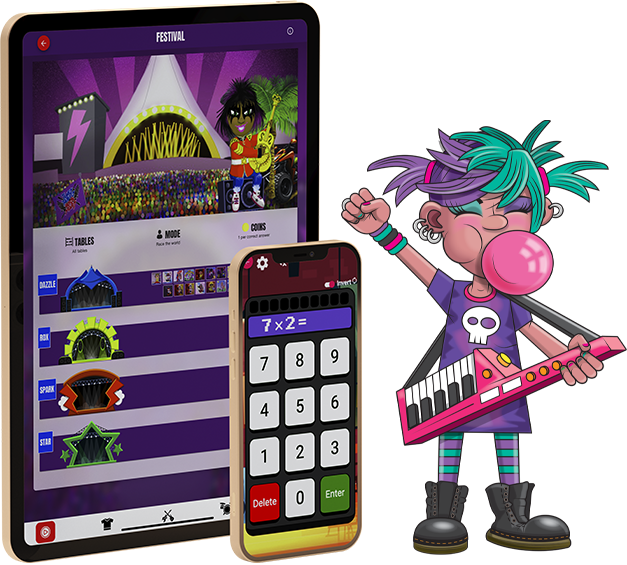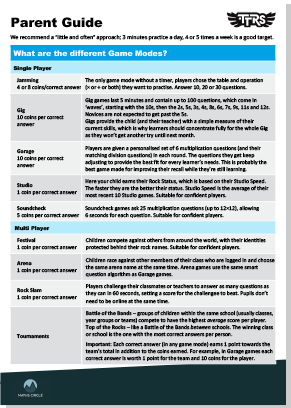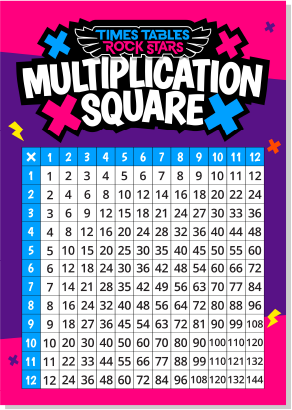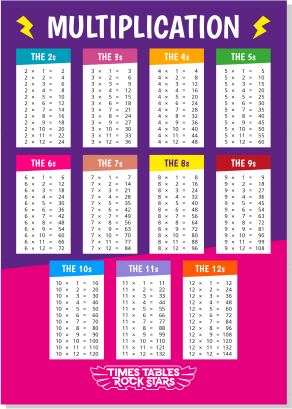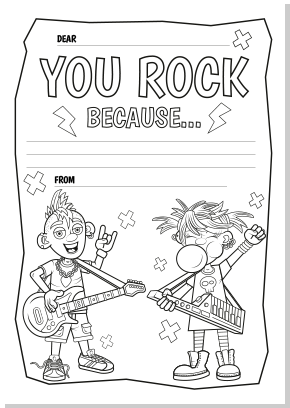

& CARERS

WHY ARE TIMES TABLES IMPORTANT?
SUPPORT LEARNING
Times tables serve as a building block for high-level maths concepts such as division, algebraic equations and more!
STRENGTHEN LIFE SKILLS
From calculating prices to managing budgets, multiplication is essential for financial literacy and general problem-solving.
BUILD CONFIDENCE
A solid grasp of times tables gives children the confidence to tackle more challenging mathematical tasks, increasing their success!

TIMES TABLES ROCK STARS
GET READY TO ROCK
Watch and learn how your children log in, navigate the platform, start practising and track their progress.
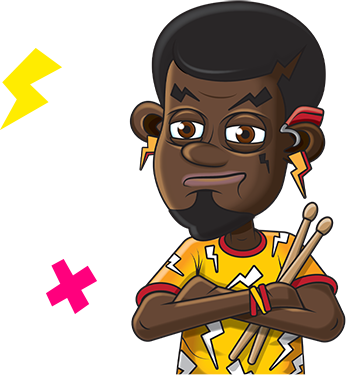
BIG IMPACT. BETTER RESULTS.
Suitable for all learners aged 6 years and up, our question-based games automatically adapt to each child’s unique learning needs, helping them to recall their times tables in record speed!
Immersed in our rock world, children earn coins, customise their avatar, compete with learners worldwide and rise from “New Artist” to “Rock Hero”!
They never need to miss a day of practice, with apps available on all devices so they can play anywhere.
Result!
A GAME MODE TO SUIT EVERY CHILD
FAQ
Our priority is to keep your children safe, which is why thousands of schools and families trust us to provide age-appropriate content and protect their data.
- No chat functions.
- No in-game purchases.
- No ads.
- Child-friendly interface enables children to play independently.
- Children play under anonymous Rock Names.
- Many accessibility functions to suit all learners.
- De-clutter the screen or hide the timer to help minimise anxiety.
- Data protection compliant.
Many of us are parents and consider the same things as you do when it comes to screen time and online safety.
Here are some ways we try to help:
* Schools have the ability to set a curfew to stop children playing too early in the morning or too late in the evening. Please speak to your child’s teacher if you feel the curfew option is worthwhile.
- After an hour of playing on TTRS on any day, a message appears on the screen to suggest they log off and take a break.
- By default, your child will appear as their rock name on leaderboards but they can go a step further and use the “Hide me” setting so that their real or rock names can’t appear on leaderboards. [Head to Settings to find that.]
- During tournaments such as a Battle of the Bands, your child’s teacher can set a daily cap on the minutes.
Log in to the Times Tables Rock Stars (TTRS) app or website with your child’s login details. Then click their avatar and select My Stats > Stats > Fluency. You’ll see a heatmap which shows their current recall time for each of the times tables facts. It will look like this:
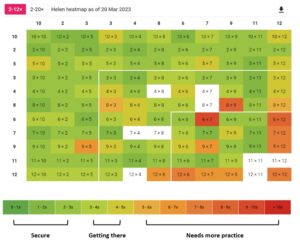
The greener the fact, the quicker the response time. Any facts shown in red or orange are slower than 5 seconds, and should be practised. The best way to practise the facts is to play in the Garage game mode, which will focus the practice on the specific facts that are orange and red in the heatmap. Remember to celebrate the ones they already know as well as encouraging them to practice more!
There are lots of ways to learn times tables, but here are a few suggestions to get you started:
- Make sure they play daily in Garage mode on Times Tables Rocks Stars – The Garage game mode is very clever and will adjust the questions your child is asked, ensuring they are always working on the facts they need to improve. Also, give them a times tables square to use whilst they play. This way they can double-check facts they are not sure about.
- Sing times tables songs. There are hundreds available! Put them on in the car, bathtime or any ‘free’ time where you have a few spare minutes.
- Chanting the old-fashioned way- rehearse the tables forwards and backwards, gradually increasing in speed. Try our Rocking and Rolling chants.
- Plenty of praise. When encouraging children to pursue something important, like times tables, there’s no harm in heightening their enthusiasm with plenty of praise. ‘You got this!’ ‘Look at your heatmap now!’
- Write out the tables – This can be in the form of a simple list or you could also be a bit more fun. Being creative will make writing and learning the tables more enjoyable.
- Write the facts as the petals of a flower;
- Get them to test you on the facts and get them wrong on purpose and see if they correct you!
- Treasure Hunt: Hide the facts around the house and give them the answers. Can they find them in record time?
- Take a pot of water and a paintbrush outside to ‘paint’ the facts on a wall.
- Use chalks to write the facts outside in giant numbers.
See also ideas from Five Minute Mum.
That’s a great question and depends a lot on their age. 6-7 year olds are typically learning the 10s, 2s and 5s. 7 to 8 year olds should know the 10s, 2s and 5s ideally and be working on the 3s, 4s and 8s over the year. Aged 8 to 9 and onwards, they should be finishing off the remaining facts from the 6s, 7s, 9s, 11s and 12s that they don’t already know.
They say that you “know” something (like a times tables answer) when you can recall it in under 3 seconds.
So you could aim for 3 seconds per question but we want to be careful not to cause feelings of anxiousness so it’s a case of balancing realism with aspirations – not always easy!
Measuring whether someone knows something isn’t always easy. We can assess their…
- accuracy; and
- time taken to answer correctly (speed, basically).
Neither are perfect by themselves but if we can only use one, then speed of correctly answering the question is the preferred metric.
Assessing a child’s knowledge of the tables purely based on their accuracy has two flaws: first, they could be really accurate but take a lot of time (social scientists would interpret that as the child not knowing them off by heart) and second, if they get questions wrong that doesn’t always mean they didn’t know the correct answer – it could have just been a typo.
So although it doesn’t always feel comfortable to measure a child’s speed in maths, time taken to give an answer does give us a decent idea of whether they know the facts.
The challenge we’ve set ourselves at TTRS is to reach all children – especially those whose speed is under development – so that everyone can say they know the times tables.
- Choose a table (e.g. the 2s)
- Ask your child a multiplication question and they point to the answer

It’s certainly very helpful. There are a lot of maths topics at school that uses multiplication or division to get to an answer. There’s no doubt that multiplication is a core skill in maths.
With good recall of times tables, a child can follow along in lessons more easily because the mental maths won’t use up a lot of their brainpower. (Conversely, if a child takes longer on the mental maths, they can fall behind with what the teacher is showing them.)
Some people will say there’s no need for children to learn the tables because we can use a calculator. While it’s true that calculator skills are important, as educators, we know that mental multiplication of small numbers is more practical than reaching for the calculator each time. Moreover, it’s totally achievable to learn the tables given the time and the right input.
Sometimes we hear “I didn’t learn the tables and I’m doing alright” or “I didn’t learn the tables but I have a degree in maths”. Our take would be, if you CAN learn the tables, it’s worthwhile. A child who knows the tables is more likely to make light work of learning maths and won’t need to use as many coping strategies to get by.
Yes! Log in to the Times Tables Rock Stars (TTRS) app or website with your child’s login details. Then click their avatar and select Settings. A range of options are available, from changing colour scheme, font and adding a declutter mode, to altering the answer input so that voice can be used rather than typing.
Experience tells us different children appreciate different adjustments to get the most from TT Rock Stars; so the platform offers a number of inclusivity options.
When they’re logged, head to Settings when they can:
- Hide the countdown clock or the score
- Declutter the screen to reduce the visual information onscreen.
- Turn off the in-game music and sound effects.
- Listen to the questions read to them
- Speak – rather than type – their answers. [Available on desktop/laptop browsers only.]
- Anonymise themselves on school leaderboards. [Choose “Hide me”.]
We all feel shy at times, especially when we’re learning something new and want to get better before sharing our achievements with others. Children can hide themselves on leaderboards by clicking their avatar and selecting Settings. From here they can toggle on the “Hide me” option.
We have a great summary which you can read here.
The new school has a TTRS subscription.
Great! The old school account can be teleported to their new school, so they can keep playing. Please send this link to their new teacher at their new school who can complete this process.
The new school does not have a TTRS subscription.
No problem! You can purchase a family subscription and teleport their account to that, so they can keep playing. Click here to follow the instructions.
If your child is getting frustated, that’s a pretty normal reaction to the following:
* Wanting to get a higher score NOW
* Making mistakes
The same feelings occur outside of maths too – when developing your talent in games, sport or music, for example.
The general approach would be to suspend the source of frustration for a while (i.e. stop playing TTRS) and talk about it when the emotions have subsided.
For example, when things have calmed down, you could say “I could tell you really wanted to beat your score. That’s a great aim and you will get there. It takes time though. So that score you want may not come today or even this week but if you keep plugging away, you’ll get there.”
Or “You know when you make a mistake, that’s your brain and your fingers disagreeing with each other. Making mistakes is actually part of learning so appreciate them as much as you appreciate the right answers. In time, your brain and your fingers will agree more with each other!”
Typically, a child refusing to practise is one who isn’t currently feeling as successful as they want so it’s important to get that feeling of success back.
There are a few strategies that could work here:
- Have deliberate “non-TTRS” time to work on the tables together. Ultimately, we want your child to feel successful and be successful at the tables, at maths and in life. TTRS can help children make astonishing progress but there are other activities you could use at the kitchen table, in the car or at bedtime. There are times tables songs on YouTube; there are times tables card games available; or you could find some printable worksheets online. The secret here will be to make it seem casual and light-hearted. If you can find ways to have a laugh while doing the tables, you can break any negative association your child may have formed.
- When they feel ready to log back in to TTRS, we would suggest ONLY playing in Jamming (where there’s no timer) for a few days or weeks. Get your child to take their time and aim for scores of 8/10, 9/10 or even 10/10. When they’re ready, get them to play in Garage where it will choose the right blend of questions for your child every time they play. A sure-fire way to convince them of their own skills is to go to Stats > Fluency and watch how their heatmap has improved since the start. No one can take that progress away from them! When they’ve restocked their maths confidence, the other game modes are back in play!
From time to time, it can boost their self-esteem if you type in the answers while they call them out but please don’t take over answering the questions as well. Your child needs the practice of retrieving the answer themselves and to make it worse, if it’s your answers then the algorithm will start providing the questions that YOU need, not your child!
Please drop us an email at [email protected] and we’ll get back to you within the hour (9am to 5pm Mon-Fri).
There are a number of studies suggesting the maths comments that parents make in front of their children – particularly mums in front of daughters – limits their child’s beliefs in their own abilities.
So try more of a ‘fake-it-til-you-make-it’ approach. Let your child believe that you can do maths or that you’re working on improving yourself. Something like “I’m pretty ok at maths and I want to get better” would be interpreted positively by children.
The trouble with saying “I’m not good at maths” in front of a child is that the message they take away might be “Maths isn’t for everyone”, “My mummy isn’t good at maths”, “If they’re not good at maths maybe I’m not supposed to be either.”
What they need to hear are positive messages about you and maths or ones with a sense of optimism or hope. That way, you’re modelling the attitude that will help them perform better.
So when they come to you asking for help with their maths homework, instead of saying “Ask your mum to help you with maths” or “I’m not a maths person” or “I was always terrible with numbers”, try getting in the habit of saying “I might be having one of those days when maths is tricky but I know tomorrow I’ll have all the answers!” or “That’s a part of maths that I don’t remember so well; shall we YouTube it together?”
Rock Status is based on how quickly you respond in the Studio (not the other game modes). Studio asks questions up to 12×12 so it may not be for everyone immediately, but it is something to work towards.
Studio Speed is measured in seconds per question (i.e. the amount of time to correctly answer a question) and is the average recall speed of the previous 10 Studio games played. So we take the most recent 10 speeds in the Studio and average them to give you a Studio Speed. The faster the Studio Speed the better the rock status.
